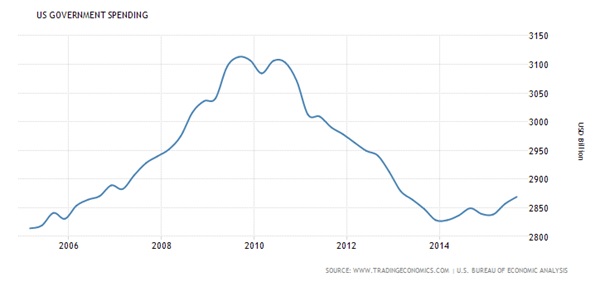How Will US Fiscal Policy Affect Gold In 2016?
 We usually focus on the Fed’s actions, but US fiscal policy can also influence the gold market. How will the recent spending bill affect the price of gold?
We usually focus on the Fed’s actions, but US fiscal policy can also influence the gold market. How will the recent spending bill affect the price of gold?The US Congress has recently passed a $1.8 trillion package of spending and tax cuts. This is a very important development for the U.S. economy and the gold market. Why?
First, the budget deal provides the federal government with funding next year and avoids a government shutdown. The smooth process of lawmaking and functioning of the federal government is not positive for the price of gold.
Second, the increased federal spending and tax cuts will provide economic stimulus just when the Fed is pulling it back. We do not consider higher government spending a sound fiscal policy (but we support tax cuts), however, it may boost GDP in the short run. The boosted economic growth in 2016 will not help the yellow metal. The more expansionary fiscal policy should encourage the Fed to a more aggressive tightening cycle. The relatively tight fiscal policy in 2010-2014 (see the chart below) could have prevented the U.S. central bank from hiking interest rates quicker. As political polarization in Congress paralyzed fiscal policy, the Fed has been the “only game in town”. That period has just ended.
Chart 1: The U.S. government spending from 2005 to 2015 (in billion dollars)

Moreover, the combination of loose fiscal policy and tight monetary policy is often a very good policy mix for a currency. The appreciation of the greenback would be negative for the gold market.
Third, the new bill ends a 40-year-old ‘ban’ on crude oil exports. It should have little impact on the U.S. economy in the short-run, but in the long-term it may help American producers, as the lifting of restrictions on oil exports opens new markets for them.
Summing up, the U.S. economy is experiencing right now important changes in both the monetary and fiscal policies. The Congress passed a $1.8 trillion package of spending and tax cuts, which will boost the fiscal measures and support GDP next year. Therefore – although increased government spending may increase the debt burden and crowd out private investment in the long-run – the spending bill will be rather negative for the gold market in the short-term.
If you enjoyed the above analysis, we invite you to check out our other services dedicated to the precious metals investors. We invite you to join our gold newsletter today – you’ll also gain 7-day trial of our premium Gold& Silver Trading Alerts. It’s free and if you don’t like it, you can easily unsubscribe.
Arkadiusz Sieron
Sunshine Profits‘ Gold News Monitor and Market Overview Editor















